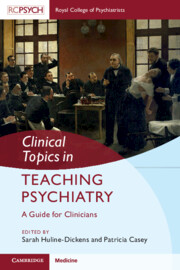Book contents
- Clinical Topics in Teaching Psychiatry
- Clinical Topics in Teaching Psychiatry
- Copyright page
- Dedication
- Contents
- Contributors
- A Note on the Cover
- Introduction
- Section 1 Teaching and Preparation
- Section 2 Teaching Methods
- Section 3 Feedback, Assessment and Supervision
- Chapter 12 Giving and Receiving Feedback in Psychiatric Education
- Chapter 13 The Postgraduate Curriculum and Assessment Programme in Psychiatry: The Underlying Principles
- Chapter 14 Supervision of Psychiatric Trainees
- Section 4 Bridging the Gaps: Foundation Years and Interprofessional Education
- Section 5 Technologies Old and New
- Section 6 Supporting the Trainee in Difficulty
- Index
- References
Chapter 14 - Supervision of Psychiatric Trainees
from Section 3 - Feedback, Assessment and Supervision
Published online by Cambridge University Press: 24 November 2022
- Clinical Topics in Teaching Psychiatry
- Clinical Topics in Teaching Psychiatry
- Copyright page
- Dedication
- Contents
- Contributors
- A Note on the Cover
- Introduction
- Section 1 Teaching and Preparation
- Section 2 Teaching Methods
- Section 3 Feedback, Assessment and Supervision
- Chapter 12 Giving and Receiving Feedback in Psychiatric Education
- Chapter 13 The Postgraduate Curriculum and Assessment Programme in Psychiatry: The Underlying Principles
- Chapter 14 Supervision of Psychiatric Trainees
- Section 4 Bridging the Gaps: Foundation Years and Interprofessional Education
- Section 5 Technologies Old and New
- Section 6 Supporting the Trainee in Difficulty
- Index
- References
Summary
Doctors in training do their learning ‘on the job’. Supervision in the workplace has a key role in ensuring patient safety and promoting professional development as part of this learning process. These twin elements are critical to understanding good supervision. If trainees are learning in their workplace, there must be systems in place to ensure they do not make mistakes that affect patient safety, but at the same time support them in learning new skills.
This chapter discusses the supervision of trainee psychiatrists and is based on an article first published in 1999 (Cottrell 1999). It is gratifying to note the many significant and positive changes in the organization of supervision that have taken place since that date. In 1999, the Royal College of Psychiatrists had responsibility for approving training schemes and specified that each trainee should have a ‘protected hour per week’ with his or her educational supervisor.
- Type
- Chapter
- Information
- Clinical Topics in Teaching PsychiatryA Guide for Clinicians, pp. 163 - 172Publisher: Cambridge University PressPrint publication year: 2022

